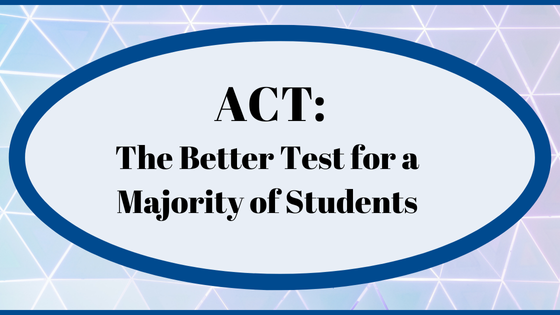
ACT: The Better Test for a Majority of Students
A majority of my private tutoring clients prefer the ACT. It is the test that lets them score best.
My own son prepared for the SAT and took it twice. He did a light review later in the year leaning on the concepts we had studied, and got a better score on the ACT. He’s only sending ACT results to colleges this fall.
So why do I have so much trouble convincing potential clients to give the ACT a try?
For decades SAT and ACT popularity were determined by geography: if you lived on the East or West Coast or in Texas, you took the SAT. If you lived in the Midwest, you took the ACT. You are also far more likely to focus on the test your parents took.
It is time to move beyond outdated geographic preferences and focus on the test that will give your student an advantage.
All Colleges Accept Both
An important note— any college or university that asks for scores for admission or scholarship purposes, will view the SAT and ACT as equal. No preference is given to one exam over the other.
If you are thinking, “But don’t some of the hard-to-get-into schools require the SAT?” You might be my age remembering when places like Rice, Duke, and Yale only took SAT scores. Those days are long gone!
For over 20 years, all colleges accept ACT and SAT scores equally.
How Do We Know Which Test to Take?
The most accurate way is to compare a practice ACT and a practice SAT. You can use your PSAT and PACT results for comparison. If you’ve never taken an ACT, you should download and print the free full-length practice test from the ACT.org website.
Do NOT go take the actual SAT or ACT to measure baseline results. For more on why: HERE and HERE. And another national news story HERE.
If you don’t want to both tests for practice, here are my general guidelines. Use them to pick one exam and take that practice test.
The ACT Might Be Right for You Unless…
There are three groups of students who are better served by the SAT. These students may do well on the ACT, but for various reasons the SAT may give them the slight edge they need.
The Ultra-High Scoring Junior
The ultra-high scoring junior is an ideal candidate for National Merit Scholarships. The PSAT, junior year only, is the qualifying exam for these awards. In order to try for National Merit recognition, these students are locked into the PSAT.
Because the PSAT and SAT are almost identical exams, it doesn’t make sense to prepare for the PSAT and the ACT. These top scoring students should prep for the SAT and PSAT in the early fall and take both exams in October.
Later junior year, these students could take the ACT if they aren’t fully satisfied with their SAT results.
Math Whiz Kids
I always think of my nephew when I describe this group. He was an amazing math student and even showed me a few alternative solutions to SAT problems. He did well on the reading part of the SAT, but was near perfect in math.
Because the SAT is 50% math, these math whiz kids prefer it to the ACT where math is only 25% of their overall score. Why dilute a powerful math number by averaging it with more reading and grammar?!
Again, these students might do well on the ACT, but the slight edge they get by having half of their test results represented with perfect or near perfect math scores, makes the SAT their test of choice.
Slower Than Average Test Takers
The final group of students are those test takers who, for whatever reason, just never have enough time on tests. They are the last ones to finish classroom exams and often run out of time. These students struggle to finish enough questions on the ACT reading and science sections.
A couple years ago, I tutored a student who fell into this category. Here’s what’s so memorable about her situation— she never missed a reading question. She was 100% accurate. Sounds incredible until you find out that she could never finish more than two of the four passages in the reading section. Her attention to detail was holding her back from scoring well on the ACT. She had to switch to the SAT where the math was harder, but where she had more time per question for reading.
Some students in this category have undiagnosed learning differences or processing speed issues. Others are just so methodical and exacting in their reading and test taking that they can’t go faster.
If you have a slower than average test taker, print off the reading and science sections from a practice ACT and see how much they can finish. They don’t need to complete every question in order to score well, but compare their results with their SAT or PSAT reading scores to see if the ACT is a viable option.
Conclusion
I think 75% of this year’s juniors would be better served by taking the ACT.
Yes, there are some students who will need to focus on the SAT, but the exceptions I’ve outlined above don’t apply to a majority of juniors.
The ACT offers a number of benefits: paper and pencil format, entirely multiple-choice math, highly coachable sections for grammar and science, more straightforward math concepts, and traditional reading comprehension questions. The ACT isn’t easy, but I do think it is the better test for a majority of students.
If you are having trouble comparing scores or making an evaluation on which test works best, I’m always happy to answer questions on my business Facebook page: https://www.facebook.com/CollegePrepLLC/